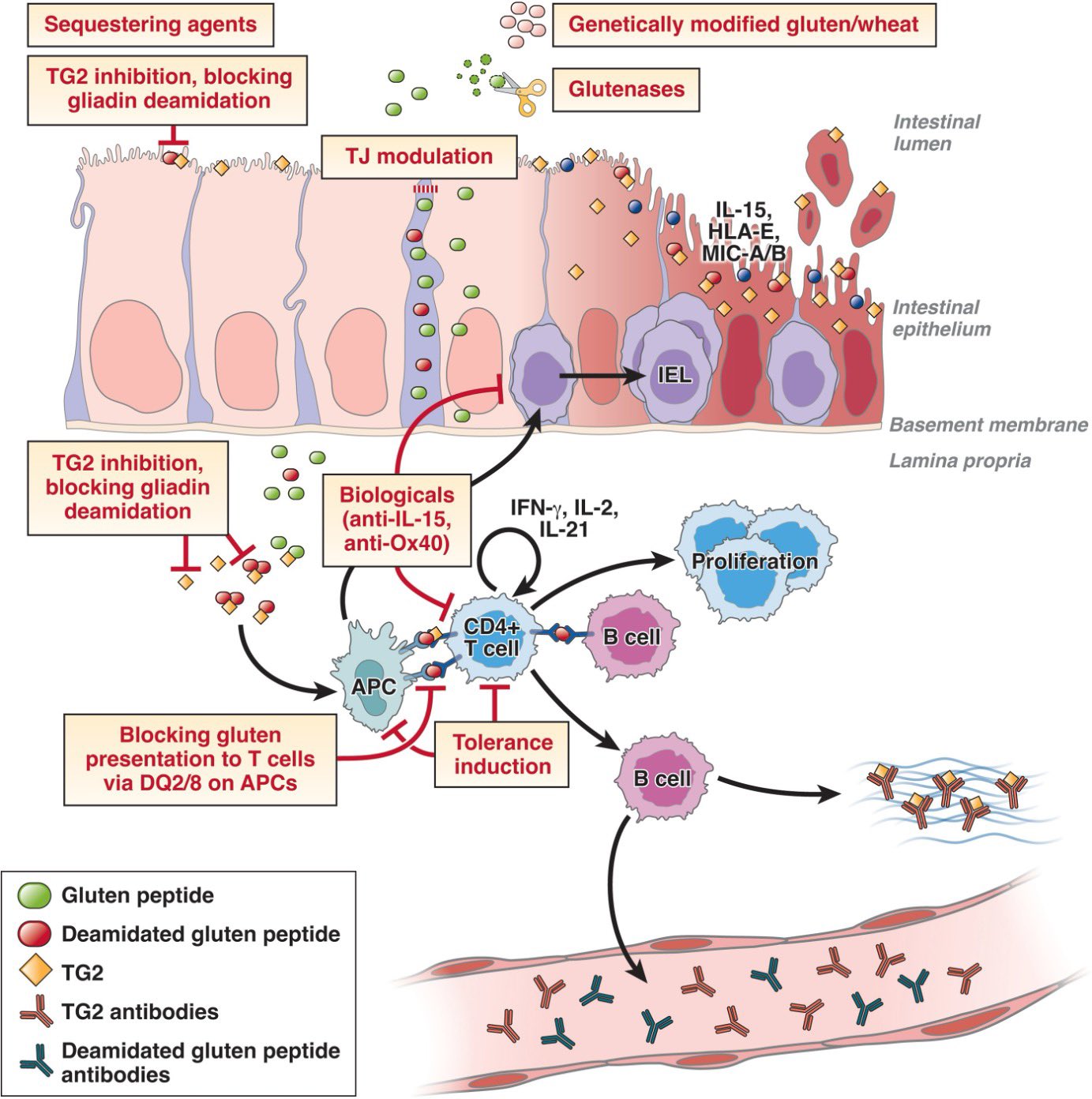Novel Therapeutic Strategies in Celiac Disease: From Genetic Manipulation to Immune Modulation
Introduction
Celiac Disease (CeD) is an autoimmune disorder triggered by gluten consumption in genetically predisposed individuals, leading to severe gastrointestinal and systemic symptoms. Recent advancements in biomedical research have brought forth innovative therapeutic strategies aiming to improve the quality of life for CeD patients. This article explores these strategies, highlighting key developments and their implications.
Therapeutic Strategy 1: Reduction in Gluten Antigenic Load
- Genetically Modified Gluten and Wheat:
- Development of Low Immunogenic Wheat Varieties: Techniques such as plasmid-mediated RNA interference have been used to produce wheat varieties like E82, which show reduced immunogenicity by targeting gliadin mRNA, sparing glutenins to preserve baking quality.
- CRISPR/Cas9 Gene Editing: This method has been employed to remove immunogenic gliadin genes from wheat, significantly lowering but not completely eliminating gluten immunogenicity.
- Regulatory Challenges: Despite advancements, regions like Europe remain cautious, labeling genetically modified organisms as “not fit for purpose” due to environmental concerns.
- Sequestering Agents:
- BL-7010: A modified polystyrene that binds gluten in the gut, preventing its absorption and showing promise in preclinical models.
- AGY and Chitosan: These agents work by binding or reorganizing gluten to reduce its digestibility and immunogenicity, with AGY currently undergoing clinical trials.
Therapeutic Strategy 2: Enzyme Therapies
- Enzymatic Degradation of Gluten:
- Latiglutenase: A cocktail of enzymes that degrades gluten peptides, shown to reduce symptoms and mucosal damage in clinical trials.
- AN-PEP: Derived from Aspergillus Niger, this enzyme promotes detoxification of gluten in the gut, with ongoing clinical trials assessing its effectiveness.
- TAK-062: An optimized enzyme that demonstrates high efficacy in degrading gluten in preclinical models but requires further studies for everyday dietary management in CeD.
Therapeutic Strategy 3: Immune Modulation
- Tight Junction Modulation and Immune Blocking Agents:
- Larazotide Acetate and IMU-856: These agents aim to reduce intestinal permeability and enhance barrier integrity, with mixed results in clinical trials.
- Cytokine Inhibition (Anti-IL-15, Anti-Ox40L): Targeting specific inflammatory cytokines to reduce epithelial damage and T-cell activation, currently in various phases of clinical evaluation.
Therapeutic Strategy 4: Tolerance Induction
- Immunotherapy Approaches:
- NexVax2 and TAK-101: Designed to induce tolerance to immunodominant gliadin peptides. While NexVax2 trials were discontinued, TAK-101 shows promising results in reducing T-cell reactivity.
- KAN-101 and TPM502: These therapies aim to induce immune tolerance via liver-targeted pathways or antigen delivery systems, with ongoing clinical trials to evaluate their safety and efficacy.
Conclusion
The gold standard treatment for celiac disease (CeD) remains a strict, lifelong gluten-free diet (GFD), which is the only approved therapy to date. However, many patients continue to experience symptoms despite adhering to a GFD, highlighting the need for additional therapeutic strategies. Current research is focused on developing adjunct therapies to protect against accidental gluten exposure and improve quality of life, especially when dining out or traveling. The ultimate goal is to re-establish immune tolerance to gluten, which could potentially cure CeD, although achieving long-lasting tolerance is challenging due to the persistence of memory T cells. Advances in tolerizing therapies and the combination of multiple therapeutic approaches are under investigation to address these challenges and may eventually benefit a wider range of patients beyond those with non-responsive CeD and related conditions.
The Figure below provides a snapshot of the current state and potential future of CeD treatment, underscoring the importance of continued research and regulatory consideration to bring these therapies from the lab to the clinic.

Reference
- Discepolo V, Kelly CP, Koning F, Schuppan D. How future pharmacological therapies for celiac disease will complement the gluten-free diet. Gastroenterology 2024 Apr 9:S0016-5085(24)00416-5.
